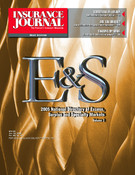The Treasury report on terrorism insurance is just one of several on the subject. Here is a summary of some other reports:
Organization for Economic Cooperation and Development, July 2005
Private markets are not yet able to fully cover the extremely large losses that could result from terrorist acts in the future. Financial markets may in the future provide additional capacity but they have so far shown little appetite for terrorism risk and are not expected to increase market capacity substantially in the short term. Public-private partnerships and a layered approach to coverage can help stabilize insurance markets after large-scale or frequent attacks. The impact of a new large-scale attack could be greater than in 2001.
RAND Center for Terrorist Risk Management Policy, June 2005
The terrorism insurance system in the U.S. is failing to provide businesses with adequate financial protection, leaving the nation vulnerable to economic disruption if there is a major terrorist attack. The terrorism insurance system is not robust enough to respond to a rapidly evolving terrorist threat against U.S. businesses and that “protecting businesses against the economic impact of a terrorist attack should be part of a robust homeland security effort.”
Marsh Inc., April 2005
Nearly half of large and mid-sized U.S. businesses obtained terrorism insurance during 2004, up from the 2003 average of 27 percent. Meanwhile, the cost was unchanged from 2003. In 2004, 70 percent of companies that purchased terrorism insurance bought a combination of TRIA and non-certified coverage. Also, businesses have been able to purchase “stand-alone” policies. If TRIA is not extended, the stand-alone market is unlikely to have sufficient capacity. It is also unrealistic to expect insurers to maintain their present terrorism capacity or to expect the reinsurance market to fill the void.
The U.S. has let a significant portion of its catastrophic risk and terrorism risk go uncovered. Some European countries do a better job of guaranteeing protection. A serious event could severely disrupt insurance markets and impose recovery costs on governments, businesses and individuals. The report questions the effectiveness of relying upon the catastrophe bond market or tax-exempt reserving to enhance insurance capacity.
Congressional Budget Office, January 2005
TRIA has led to a rise in the percentage of companies that buy terrorism coverage, mainly in high risk locations. In the absence of TRIA, an unexpectedly large loss from a terrorist attack would be likely to produce another episode of scarce coverage, rising prices, and uninsured assets. However, it is easy to exaggerate the overall costs to the economy of reducing the federal subsidy for terrorism insurance; in fact, those costs are likely to be small. The expiration of TRIA or the addition of cost-based premiums could stimulate the development of alternatives, including mutual reinsurance pools and catastrophe bonds.
Analysis Group, September 2004
Columbia Business School Professor R. Glenn Hubbard concludes that by limiting insurers’ exposure to catastrophic terrorism losses, TRIA has had a stabilizing influence on the economy. If another catastrophic terrorist attack occurred in the absence of TRIA, tens of thousands of jobs would be lost due to lack of coverage. Absent another major attack, the economic drag produced by the lack of a federal terrorism insurance backstop would cost Americans in several ways: U.S. gross domestic product may be $53 billion lower, household net worth may be $512 billion lower, and roughly 326,000 fewer jobs may be created. This drag on the economy will be felt before TRIA’s scheduled expiration.
Consumer Federation of America, April 2004
The terrorism insurance law is not necessary to ensure the availability of affordable terrorism coverage for most areas of the country and should be allowed to expire. Private insurers will be completely responsible for all terrorism insurance losses in all but nine large cities by 2005, before the law expires. The industry is financially capable of handling terrorism losses, which are expected to be relatively modest.
Topics USA Catastrophe Natural Disasters
Was this article valuable?
Here are more articles you may enjoy.


 Insurify Starts App With ChatGPT to Allow Consumers to Shop for Insurance
Insurify Starts App With ChatGPT to Allow Consumers to Shop for Insurance  Florida Engineers: Winds Under 110 mph Simply Do Not Damage Concrete Tiles
Florida Engineers: Winds Under 110 mph Simply Do Not Damage Concrete Tiles  Fla. Commissioner Offers Major Changes to Citizens’ Commercial Clearinghouse Plan
Fla. Commissioner Offers Major Changes to Citizens’ Commercial Clearinghouse Plan  Experian Launches Insurance Marketplace App on ChatGPT
Experian Launches Insurance Marketplace App on ChatGPT 


